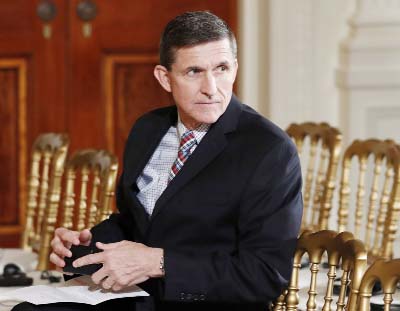
AP, Washington :
In late November, a member of Donald Trump’s transition team approached national security officials in the Obama White House with a curious request: Could the incoming team get a copy of the classified CIA profile on Sergey Kislyak, Russia’s ambassador to the United States?
Marshall Billingslea, a former Pentagon and NATO official, wanted the information for his boss, Michael Flynn, who had been tapped by Trump to serve as White House national security adviser. Billingslea knew Flynn would be speaking to Kislyak, according to two former Obama administration officials, and seemed concerned Flynn did not fully understand he was dealing with a man rumored to have ties to Russian intelligence agencies.
To the Obama White House, Billingslea’s concerns were startling: a member of Trump’s own team suggesting the incoming Trump administration might be in over its head in dealing with an adversary.
The request now stands out as a warning signal for Obama officials who would soon see Flynn’s contacts with the Russian spiral into a controversy that would cost him his job and lead to a series of shocking accusations hurled by Trump against his predecessor’s administration.
In the following weeks, the Obama White House would grow deeply distrustful of Trump’s dealing with the Kremlin and anxious about his team’s ties. The concern – compounded by surge of new intelligence, including evidence of multiple calls, texts and at least one in-person meeting between Flynn and Kislyak – would eventually grow so great Obama advisers delayed telling Trump’s team about plans to punish Russia for its election meddling. Obama officials worried the incoming administration might tip off Moscow, according to one Obama adviser. This account of the closing days of the Obama administration is based on interviews with 11 current and former U.S. officials, including seven with key roles in the Obama administration. The officials reveal an administration gripped by mounting anxiety over Russia’s election meddling and racing to grasp the Trump team’s possible involvement before exiting the White House. Most of the officials spoke on the condition of anonymity in order to discuss sensitive national security information.
The Obama White House’s role in the Russia controversy will come under fresh scrutiny Monday. Former Director of National Intelligence James Clapper and former deputy Attorney General Sally Yates are slated to testify before lawmakers on the Senate Judiciary Committee, one of three committees investigating Trump’s associates links to Moscow.
In late November, a member of Donald Trump’s transition team approached national security officials in the Obama White House with a curious request: Could the incoming team get a copy of the classified CIA profile on Sergey Kislyak, Russia’s ambassador to the United States?
Marshall Billingslea, a former Pentagon and NATO official, wanted the information for his boss, Michael Flynn, who had been tapped by Trump to serve as White House national security adviser. Billingslea knew Flynn would be speaking to Kislyak, according to two former Obama administration officials, and seemed concerned Flynn did not fully understand he was dealing with a man rumored to have ties to Russian intelligence agencies.
To the Obama White House, Billingslea’s concerns were startling: a member of Trump’s own team suggesting the incoming Trump administration might be in over its head in dealing with an adversary.
The request now stands out as a warning signal for Obama officials who would soon see Flynn’s contacts with the Russian spiral into a controversy that would cost him his job and lead to a series of shocking accusations hurled by Trump against his predecessor’s administration.
In the following weeks, the Obama White House would grow deeply distrustful of Trump’s dealing with the Kremlin and anxious about his team’s ties. The concern – compounded by surge of new intelligence, including evidence of multiple calls, texts and at least one in-person meeting between Flynn and Kislyak – would eventually grow so great Obama advisers delayed telling Trump’s team about plans to punish Russia for its election meddling. Obama officials worried the incoming administration might tip off Moscow, according to one Obama adviser. This account of the closing days of the Obama administration is based on interviews with 11 current and former U.S. officials, including seven with key roles in the Obama administration. The officials reveal an administration gripped by mounting anxiety over Russia’s election meddling and racing to grasp the Trump team’s possible involvement before exiting the White House. Most of the officials spoke on the condition of anonymity in order to discuss sensitive national security information.
The Obama White House’s role in the Russia controversy will come under fresh scrutiny Monday. Former Director of National Intelligence James Clapper and former deputy Attorney General Sally Yates are slated to testify before lawmakers on the Senate Judiciary Committee, one of three committees investigating Trump’s associates links to Moscow.

